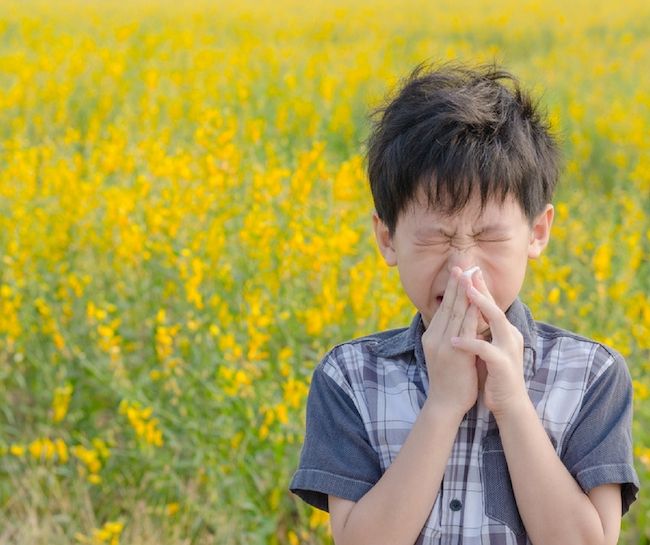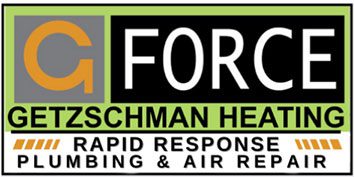Top 4 Allergens in Your Home and How to Get Them Out

More than 50 million people in the U.S. currently suffer from allergies. If you find yourself a victim to allergies you know spring is one of the hardest times of the year. The team at Getzschman Heating and Air Conditioning wants to help. We may be a heating and cooling company, but we also want to help you with your allergies,.
Are You Always Sick?
One way to prevent this sickness is by improving the air quality within your home. If you have health problems that improve when you leave your house and worsen when you return, this is a big clue. At least one third of your life is spent within your home (mostly when you are sleeping) so it may be time to take preventative steps towards improving your air quality indoors.
Everyday Irritants in Your Home’s Air
Everyone is familiar with air quality problems like asbestos, second-hand smoke, and radon. These issues are all dangerous, but they are not the only or the most common air pollutants. If you’re looking for everyday air quality issues, look for the following:
1. Bacteria and Viruses
Not all germs make you sick. However, there are various kinds of bacteria and viruses that will give you the flu or a cold and they can worsen other problems like asthma. If you or a family member continues to get sick, you may have an issue with too many germs in your air.
Additionally, many germs thrive in warm humidity. One way to prevent this is to make sure your home is well ventilated and the humidity is not over 50 percent. Buying a dehumidifier can help with the high levels of humidity.
2. Dust Mites
Microscopic bugs, known as dust mites, feed on dead human skin cells often found in dust. These dust mites aren’t dangerous but can trigger a reaction for those with asthma or allergies. This reaction may cause someone to get a cough, sneeze constantly, become congested, or have a severe asthma attack.
Reducing your home’s humidity level to below 50 percent can help get rid of dust mites. The best treatment is to get rid of places they can live, like upholstered furniture, curtains, and carpets. Additionally, brushing your bedding once a week with a damp cloth and hot water will help as well.
3. Mold
As mentioned above, extra humidity will spread germs and contribute to an increase in dust mites. But its most common effect is mold growth. Mold spores can cause nasal congestion, wheezing, coughing, sneezing, and sore throats. Just like dust mites, those with asthma or allergies may have particularly nasty reactions to mold.
Mold tends to grow in places with extra water, like your bathroom. You might also smell a musty odor. In order to eliminate mold, you need to eliminate the excess water, which sometimes is caused by leaky pipes and poorly ventilated bathrooms. Again, keep the humidity level in your home below 50 percent.
Fix any leaks in your home or in your plumbing, run an exhaust fan in your bathroom, and increase airflow and ventilation. Clean the places where you see mold growing often.
4. Building Materials
New or recently remodeled homes may have materials that emit fumes. For example, building materials made of pressed wood, like plywood, can emit volatile organic compounds, or VOCs. VOCs in your home’s air can irritate eyes, noses, and throats. You can even feel nauseous and have trouble breathing. Some VOCs, such as formaldehyde, can cause cancer.
VOCs can also be found in products like paint, paint remover, cleaning chemicals, glue and air fresheners. When purchasing these products, try to find the lowest VOC levels. Then get rid of the unused materials after your project is done.
Ventilation will also improve the air quality indoors. Allow proper time for materials like plywood to air out before using them. Once you bring the materials into your home, open a window and turn on a fan.
3 Solutions for Ridding Your Home of Allergens
At Getzschman Heating and Air Conditioning, we offer several ways to help rid your home of allergens:
1. Duct Cleaning
One ounce of dust contains nearly 42,000 living dust mites. Consider that up to 40 pounds of dust gets into your home every year, and up to 15 pounds of that can get trapped in your duct system. Get rid of that dust as well as pollen, fungi, and bacteria with our duct cleaning service.
Related Read: 7 Houseplants That Can Help You Breathe Easier
2. Air Scrubbers Remove Particles from the Air in Your Home
Once the dust and allergens are out of your home, you’ll want a way to keep them out. For this, we recommend the Air Scrubber Plus air cleaner. There are three classes of indoor air pollutants: particles, mold-mildew-bacteria, and odors/chemical vapors.
Our Air Scrubber Plus system uses positively and negatively charged ions to make the particles attracted to each other. This attraction makes the particles clump together so they can be trapped by your air filter.
Related Read: 3 Reasons to Install an Air Cleaner in Your Home
3. UV Germicidal Lamps
Mold, mildew, and other biological contaminants can settle on surfaces inside your HVAC system and circulate through your home’s air. UV germicidal lamps emit rays of ultraviolet light that penetrate the cell walls of these contaminants and kill them. They work continuously even when your heating or cooling system isn’t on. Just one less thing to bother your allergies.
Timely Tips for Allergy Sufferers
Keep the House Closed Up Tight – Don’t be tempted to open the windows on a nice day. This will let more than just fresh air into your home.
Shower at Night – Your hair harbors all kinds of allergens. Showering at night will not transfer this to your pillow to breathe all night long. Go to bed with clean hair to ensure you don’t exacerbate your allergy symptoms.
Change Your Filter on Your AC Often – Keep the air as clean as possible by replacing your air filter at least once a month.
Go Barefoot at Home – Don’t drag in all of the allergens on your shoes. They will embed themselves into rugs and carpeting. Remove your shoes when you get home.
Use the Re-Circulate on Your Vehicle’s AC – By recirculating the air in your vehicle instead of letting new air in, you will decrease the amount of allergens you are exposed to. And definitely keep the windows rolled up and the air conditioner on.
Lower the Humidity in Your House – Mold loves humidity. If you lower the humidity level to less than 60%, it will discourage mold growth.
Pay Attention to the Allergy Reports – If the pollen, ragweed, mold, etc. count is high, it’s best to limit your outdoor activities that day if possible.
If you suspect the air in your home is causing problems, give the indoor air quality team at Getzschman call and we can let you know all of your options for cleaner air. Call us at (402) 554-1110 or contact us online.
